Libra and the central bank's digital currency are making rapid progress, is there a future for bitcoin payments? (with comparison table)
In 2008, the Bitcoin White Paper was launched, officially opening the first cryptocurrency experiment in human history.
In 2014, the central bank set up a special research team to conduct research on key technologies and distribution environment of digital currency, and stepped out of the first step of central bank digital currency research and development.
In 2019, Facebook, with 2.7 billion users, published the Libra white paper, which aims to create a simple, borderless currency and financial infrastructure for billions of people, setting off the climax of giant hair.
The three crossed time and space, but they successively aimed at paying the track: the central bank's digital currency mainly focuses on domestic retail payment scenarios, Libra focuses on cross-border payments, and Bitcoin creates a digital currency and online payment system that is different from the traditional financial system. .
- Opinion: Can DAO be used to enhance the decentralization of DeFi products?
- Bitcoin Quotes: Boots are gradually falling, waiting patiently for market direction
- Babbitt Column | Gu Yanxi: Six Impacts of Bakkt on the Bitcoin Trading Market
They are also very different: the central bank's digital currency is dominated by the central bank, which is an effective supplement to the legal currency, and is directly regulated by the government; Libra is led by Facebook, managed by the Libra Association, and regulated by countries; Bitcoin is completely decentralized. The total amount is constant, and anyone can theoretically hold it by mining or trading.
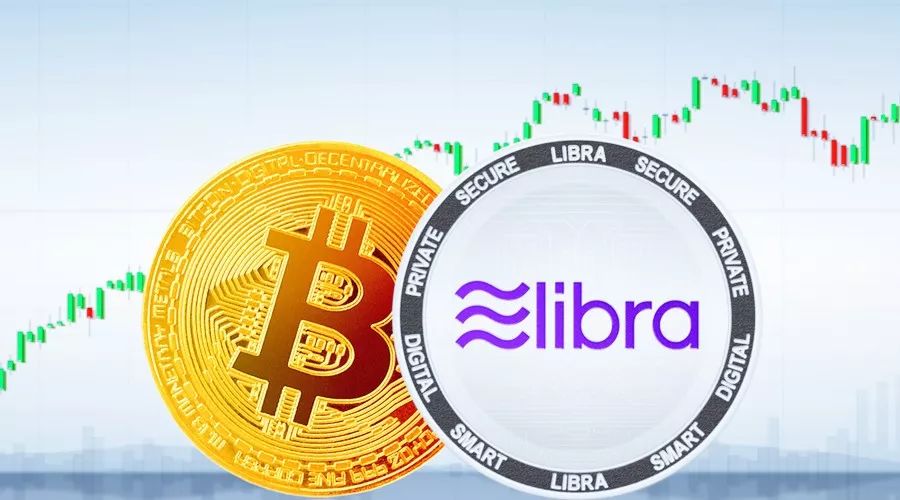
From the perspective of the development process, Bitcoin is clearly at the forefront: after more than 10 years of evolution, although it has not developed into a real payment currency, it has accumulated a large user base on a global scale, and its market value even exceeds that of South Korea and Brazil. The national currency of Canada, Mexico, and Australia has become the 11th largest currency in the world and is regarded as “digital gold”.
Of course, Bitcoin is not a success in terms of payment: at the technical level, the Bitcoin expansion solution Lightning Network is booming. In the first half of 2019, the number and capacity of its nodes almost doubled. On the landing level, merchants that support Bitcoin payments worldwide have More than 15,000; at the policy level, more and more countries recognize the legal status of Bitcoin and accept Bitcoin for payment settlement.
However, the shortcomings of Bitcoin's payment function are still outstanding. In addition to the limitations of network performance, factors such as currency price fluctuations and global supervision have restricted its further development.
In the face of the attack of latecomers, where will bitcoin payment go?

Central bank digital currency, Libra, bitcoin big contrast
The same payment, the central bank's digital currency, Libra and Bitcoin's distribution purposes, operating systems, landing scenarios, etc. are different.
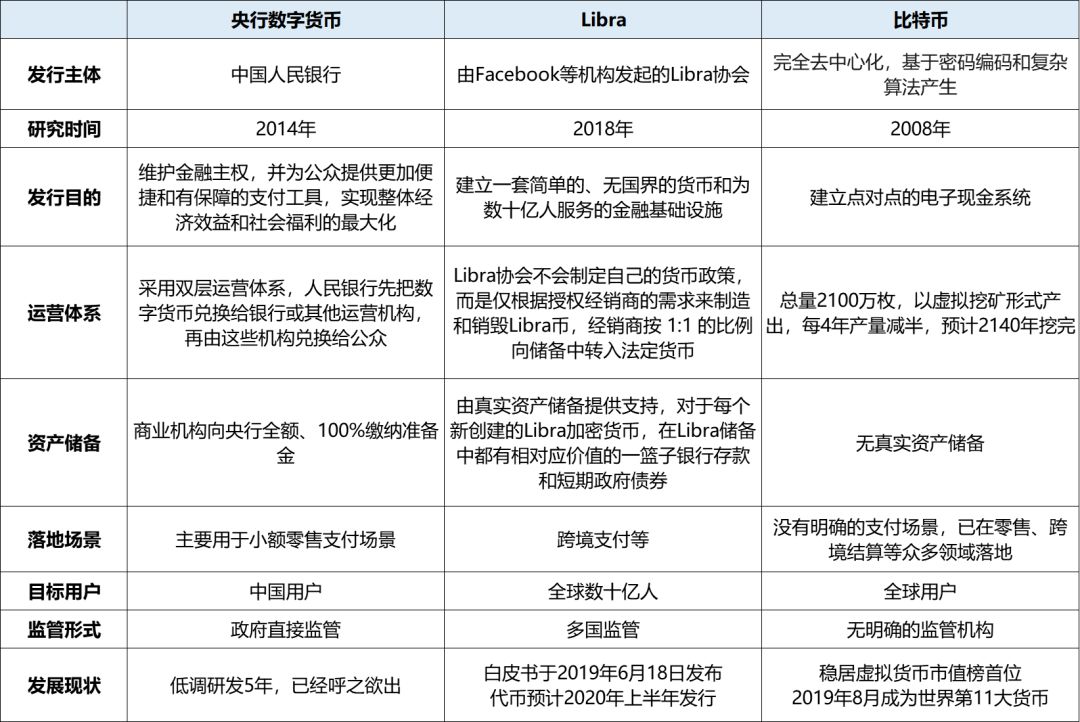
The development of the central bank's digital currency began in 2014. After five years of preparation, more and more details have surfaced.
On August 10, at the China Financial Forty Forum, the Deputy Director of the Central Bank's Payment and Settlement Department, Mu Changchun, said that since last year, the relevant personnel of the Digital Money Institute have been “996” and the central bank's digital currency is on the horizon. He also disclosed the design concept and technical framework of the central bank's digital currency:
2. With a two-tier operating system, the central bank first converts the digital currency to a bank or other operating agency, which then converts it to the public.
3. The commercial institution needs to pay the central bank a full amount and 100% of the reserve. The central bank's digital currency is still the central bank's debt, which is guaranteed by the central bank's credit and has unlimited legal liability.
5. At this stage, the central bank's digital currency design focuses on M0 substitution instead of M1 and M2 replacement. Libra is also collateralized by the so-called 100% reserve assets, but it is not limited to M0, and there may be currency overshoot.
6. Must have high scalability, high concurrency performance, for small retail high frequency business scenarios, can load smart contracts.
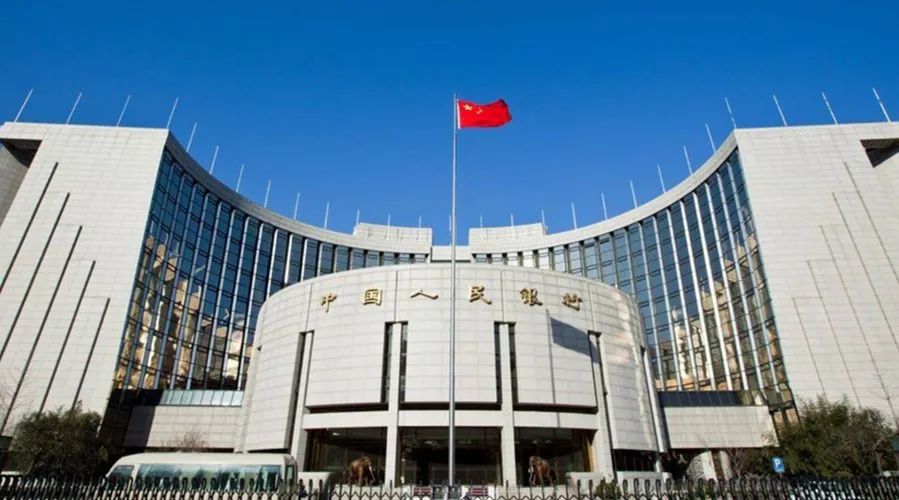
In contrast, Libra, led by Facebook, is still in its early stages and has some uncertainty.
In May last year, Facebook established a blockchain department to carry out low-key research and development work on cryptocurrency. In June of this year, the Libra white paper was officially released. According to the description, Libra's mission is to establish a simple, borderless currency and financial infrastructure for billions of people, managed by the non-profit organization Libra, which has Mastercard, PayPal, PayU, etc. 28 Founding members.
Unlike most cryptocurrencies, Libra is fully supported by real asset reserves. For each newly created Libra cryptocurrency, there is a basket of bank deposits and short-term government bonds of relative value in the Libra Reserve to build public trust in its intrinsic value.
Libra also inherits several features of the new digital currency – the ability to quickly transfer funds, secure security through encryption and easy and free transfer of funds across borders, and is expected to be released in the first half of 2020.
However, since the release of the Libra white paper, regulators have been pressured to increase Libra's variables. In the quarterly report submitted to the US Securities and Exchange Commission, Facebook also reminded investors that there are many factors that may prevent Libra from launching as scheduled.
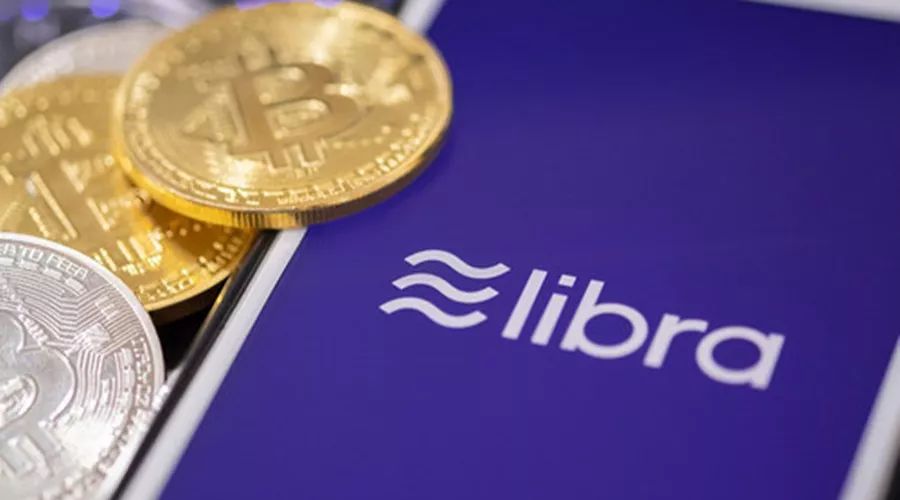
Bitcoin has been in development for 10 years compared to the central bank's digital currency and Libra. It has a mature technology system and an increasingly large user base. In the payment phase, the fast-growing lightning network activates the payment function of Bitcoin. In the view of Bitcoin believers, Bitcoin will formally enter the 2.0 era of "payment currency" from the 1.0 era of "Digital Gold".
Supporting this assertion is an innovative breakthrough in Lightning Networks: highly scalable, capable of accommodating millions to billions of transactions per second; instant transactional, transaction time in milliseconds; transaction costs are extremely low enough Support micropayment application scenarios.
According to new data released by cryptanalysis company CoinGecko, from January 1 to June 30, the network capacity of Bitcoin's layer-2 protocol increased by 87%, and the number of nodes increased from 2,298 to 4,576. 100%.
At the same time, more and more startups joined the development and promotion of Lightning Network this year:
In June, Bitrefill announced that users of the US mainstream cryptocurrency exchange and wallet service provider Coinbase can use their full set of lightning network services directly through the exchange account.
In July, Fold announced the integration of Bitcoin's Lightning Network into its applications to help users use Bitcoin at Amazon, Starbucks, Uber and other large retailers.
However, the stability of Bitcoin's value, compliance, and the security of Lightning Network technology are all challenges for Bitcoin to become a mainstream payment method. Fortunately, Bitcoin payment is “popular” on a global scale, covering major consumption scenarios such as catering, accommodation, and shopping.

Bitcoin payment scenario big inventory
According to Coinmap data, as of press time, there are 15,355 merchants in the world accepting bitcoin payments. Most of these merchants are located in more developed countries and regions such as North America and the European Union . The number of merchants in Argentina and Venezuela affected by economic instability is also increasing.

According to public reports, Mars Financial APP (ID: hxcj24h) has sorted out the main landing scenarios of Bitcoin payments:
Shopping consumption
In July this year, according to foreign media reports, more than 1,400 stores of the Australian supermarket chain IGA are accepting bitcoin and other cryptocurrency payments.
It is reported that IGA's solution provider is TravelbyBit, which has received a strategic investment in the currency security, equipped with PoS equipment for each supermarket checkpoint of IGA, which supports payment using BTC, ETH, LTC, etc.
In addition, some companies are promoting Bitcoin online shopping. In April of this year, the encryption payment processing startup Moon announced that as long as the application is extended through its browser, all wallets that support the lightning network can directly spend cryptocurrencies such as Bitcoin on Amazon.com.
Pay wages
The biggest recent development in bitcoin payments is to become a legal payment method in New Zealand. Recently, the New Zealand Taxation Office (IRD) stated in its income tax law that employees can pay wages through encrypted assets. Morgan Stan co-founder Pomp commented that New Zealand became the first country to legalize bitcoin's national sovereign currency to pay workers' wages.
At the same time, more and more organizations and institutions began to use Bitcoin to settle their wages, such as Swiss media giant Netzmedien, Japanese network service provider GMO Internet Group, and NBA team lone ranger and king.
Twiiter and mobile payment company Square co-founder and CEO Jack Dorsey also said on Twitter that Square is recruiting three to four cryptocurrency engineers and one designer full-time for bitcoin and cryptocurrency ecology. Make an open source contribution. He revealed that these developers will receive wages in the form of bitcoin: "You can work anywhere, report directly to me, we can give you bitcoin!"
3. Cross-border payment
Fast speed and low cost make Bitcoin popular in cross-border payments.
In August, according to Coindesk, Bantotal, the leading provider of banking technology in Latin America, is working with Bitex, a cryptocurrency exchange, to help 60 Latin American banks use Bitcoin for cross-border payments.
According to the report, bitcoin payments have reduced the time for exporters between Argentina and Paraguay from one month to one hour.
4. Traffic travel
According to the bitcoinexchangeguide report, since February 6, 2019, residents of 37 cities in Argentina can use Bitcoin to pay for public transportation. As early as May 2018, the country's Banco Masventas Bank already supported the use of bitcoin for cross-border payment services.
In addition, according to Cryptoglobe news, in July this year, users of the public transportation system in Fortaleza, the capital of the state of Ceara, Brazil, will use Bitcoin to purchase tickets. By the end of 2019, the BTC payment port will be incorporated into the city's autonomous ticketing application, allowing travelers to pay for bitcoin by scanning the QR code and then scanning the QR code by the device located on the vehicle. In addition to BTC, users can also purchase transportation tickets using a debit card, credit card or frequent flyer program.
More and more airlines are also accepting bitcoin payments. In July this year, Norwegian Airlines, the third largest airline in Europe, announced that it will launch a bitcoin exchange service. In addition to bitcoin transactions, the company’s customers can also use Bitcoin to purchase tickets, earn points through transactions, and use points to earn flights. Discounts and other benefits.
5. Traveling out
Mars Finance App noted that Bitcoin's position among travel companies around the world is also rising. For example, Corporate Traveler, the UK's largest travel management company, accepts bitcoin payments, and US travel company Expedia accepts Bitcoin to book hotels and flights through Coinbase. The reason for this may be that when tourists travel around the world, they have to face the trouble of calculating exchange rates between different countries, and using bitcoin payment can save this trouble.
Not only that, but agencies such as the Tourism Bureau in some countries are also promoting bitcoin payments. In March 2018, the German National Tourist Office announced the payment of Bitcoin and other cryptocurrencies as its services. In August of the same year, Queensland, Australia issued a license to the TravelbyBit digital currency payment platform to promote the development of local tourism.
6. Paying business tax
In January, according to Fortune, online retailer Overstock announced that it would use Bitcoin to pay for some of Ohio's business tax. Ohio State Finance Minister Josh Mandel said the Bitcoin tax plan is designed to facilitate business and promote the state as a leader in blockchain technology.
Mandel also added that taxpayers pay only 1% of the fee for using Bitcoin, which is lower than 2.5% for credit card payments.
7. Takeaway settlement
In January of this year, Lieferando.de, Germany's largest online food distribution platform, has expanded to more than 13,000 restaurants and accepts bitcoin payments.
It is reported that Lieferando.de is headquartered in Berlin and its business is mainly to provide a variety of food distribution throughout the country. Online customers can pay with Bitcoin, Credit Card, Sofort or PayPal.
The company said that there would be no processing fees for paying with Bitcoin, and an additional 6% for PayPal and credit card payments.
8. Pay tuition
In October last year, according to foreign media reports, the French Financial Business School offered postgraduate courses in finance and blockchain technology, allowing students to pay tuition in digital currency. Since the agency launched the initiative, about six students have used BTC to pay tuition for the 2018 school year.
It is reported that one-quarter of the school's enrollment targets are from abroad, and many students have to bear complex and strict transfer costs. The French Finance Business School says accepting digital currency charges allows foreign students to cut costs and trade easily.
Coincidentally, the German private business university Berlin ESMT has also announced support for bitcoin payment of tuition fees. This move also made Berlin ESMT the first university in the German Higher Education Institute to accept bitcoin payment for tuition and fees.

Advantages and obstacles of bitcoin payment
There are more and more Bitcoin payment scenarios, what are the advantages?
In the view of Liu Chang, a doctor of economics at Peking University and founder of Zhimi University, bitcoin surpassed the natural restrictions of gold and the power ills of legal currency, eliminating the huge institutional implementation costs and exchange costs of legal currency, and achieving credit at a lower cost. expansion.
In his analysis of the article, he emphasized that Bitcoin payments have inherent technological advantages and room for expansion compared to French currency:
1. Bitcoin can use various payment technologies that are available in French currency. The main payment methods of the legal currency system include banknotes, bank accounts, debit cards, credit cards, and electronic cigarette inher banks, Alipay, WeChat payment, etc. These payment technologies can be transplanted to the Bitcoin system, which is not difficult.
2. Bitcoin is a natural internet currency. Bitcoin was originally out of the shackles of traditional natural media and social relationships, and was naturally suitable for electronic use. Its emergence broke the boundary of the free circulation of legal currency, and made the Internet economy have its own blood circulation system.
3. The openness of Bitcoin technology spurs payment innovation. The Bitcoin system is completely open, anyone can try to learn and improve it. Bitcoin payments are easier to motivate and embrace innovation than any other currency, which is unimaginable under the traditional financial system.
4. Bitcoin technology can be extended from currency to more areas. Bitcoin's asymmetric encryption and blockchain technology, as well as the growing and expanding blockchain, can be used not only for monetary functions, but also for many socio-economic activities related to rights identification and information notarization.
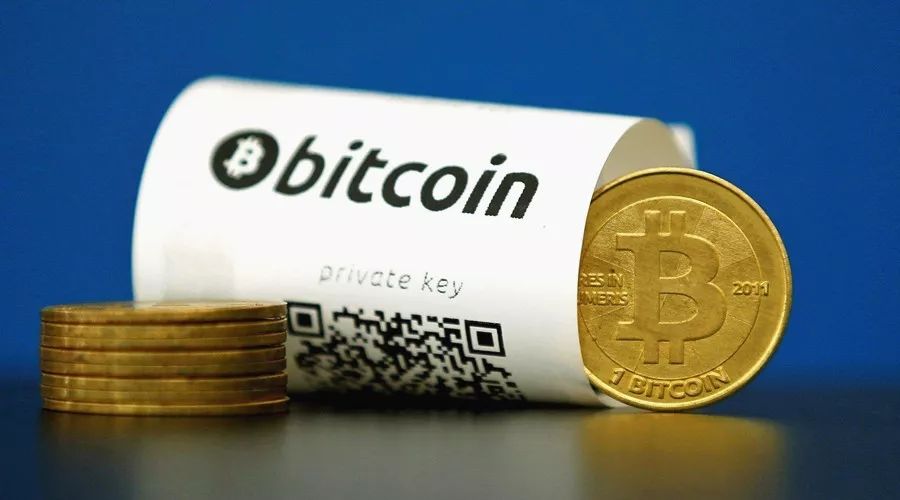
Of course, there are many obstacles to Bitcoin payment. Liu Chang uses 7 points:
1. The scale effect of legal currency to curb the development of Bitcoin. The use of money has a scale effect. There are many people using a certain currency. It is more convenient to hold this currency for payment, but it is difficult to buy something that you want to buy with Bitcoin, because most people are only willing to accept it. French currency.
2. The bitcoin market is insufficiently deep and volatile. Although the scale of Bitcoin's transaction against French currency has increased significantly since 2013, the transaction depth is still thin, and the slightly larger trading behavior will cause large price fluctuations and increase the operational risk of related activities.
3. Bitcoin development is constrained by current systems and laws. Bitcoin, as a new and important economic thing, lacks compatibility with existing systems and laws, resulting in the lack of necessary institutional norms and legal protection for bitcoin-related economic activities, and the increase of corporate and individual Participate in risk.
4. Currency regulation and deflation concerns in the Bitcoin economy. The contradiction between the Bitcoin system and the macro regulation of the regulatory authorities has led to concerns in the economics and monetary authorities that have limited the development of Bitcoin at the institutional and legal levels.
5. The risk of crime and money laundering caused by bitcoin anonymity. In the case that the relevant legal system is not sound enough, the anonymity of Bitcoin provides convenience for illegal activities and will cause certain damage to the development of the Bitcoin system.
6. The popularity and popularity of Bitcoin knowledge is insufficient. In general, the popularization of Bitcoin is far from enough, so that the demonization of Bitcoin and the fraudulent activities in the name of Bitcoin are more prosperous than Bitcoin itself.
7. Lack of safe and convenient means of holding money and payment. Since the entry of Bitcoin into the public eye, security incidents have been numerous, mainly due to the loss of private keys or hacking. Although the security of the Bitcoin system itself is high, there are many security vulnerabilities in the personal holding and receiving of Bitcoin.

Prospects for Bitcoin Payments
In the Bitcoin white paper, Nakamoto defines it as “a peer-to-peer electronic cash system” intended to create a new financial currency system that enables peer-to-peer online payments.
However, what really pushes Bitcoin to prosperity is not its payment attribute, but the value storage function, which seems to contradict Nakamoto's original intention. The reason is that if Bitcoin is used as a payment tool, it is affected by internal factors such as network congestion, and is also affected by external factors such as global regulation.
In this regard , Forbes has issued a document that in the past few years, as people pay more and more attention to the use of Bitcoin as a means of value storage, the use of Bitcoin in the payment field has been relegated to the second line, but due to the development of lightning network, payment Use cases are now coming back, but still face serious regulatory obstacles.
In contrast, the central bank's digital currency and Libra started late, but they are easier to promote. For example, in terms of currency stability, domestic commercial institutions need to pay the full amount and 100% of the reserve to the central bank, while Libra is supported by real asset reserves. Each newly created Libra cryptocurrency has a basket of bank deposits and short-term government bonds of comparable value in the Libra Reserve, which are not available in Bitcoin.
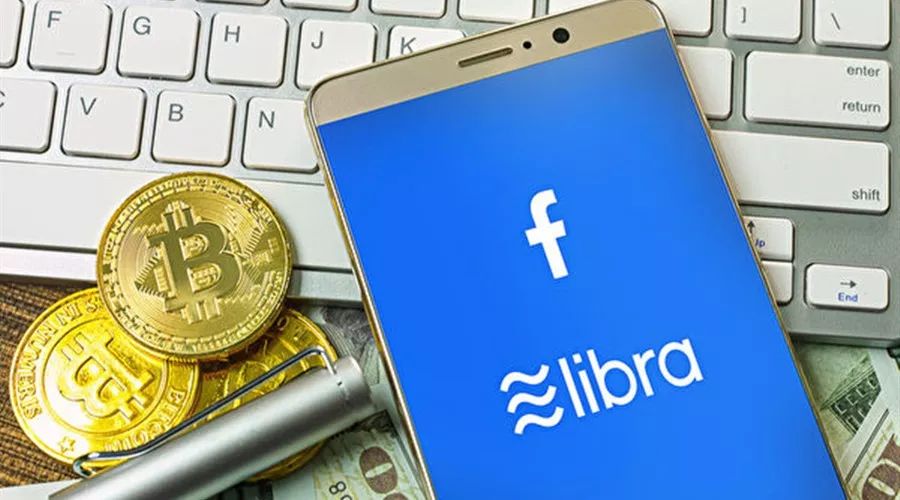
For now, despite the increasing number of bitcoin payment scenarios, there is still a long way to go to become a truly powerful payment tool. As for the end of the road, no one knows, just as 10 years ago, Nakamoto could not imagine today's bitcoin, and we can't predict the next decade of Bitcoin.
Reference article: "What is the advantage of Bitcoin payment? "Author: Liu Chang with
Interactive moments:
Produced | Mars Financial APP (ID: hxcj24h)
We will continue to update Blocking; if you have any questions or suggestions, please contact us!
Was this article helpful?
93 out of 132 found this helpful
Related articles
- Market analysis: BTC pulled up in the morning, the bulls began to test the disk
- The miners’ income is high, and the total revenue of bitcoin mining has reached a record high of 14 billion US dollars.
- US government action escalates, blacklist of cryptocurrency addresses will grow longer
- After analyzing 93 emotional indicators, they found that Reddit can affect the USDT market value.
- 2019 than the original global developer conference ended: high open source banner, focus blockchain application landing
- Is Lightning Network really the best expansion solution for Bitcoin?
- Winklevoss brothers: The bitcoin market is still dominated by retail investors, Wall Street is absent-minded




